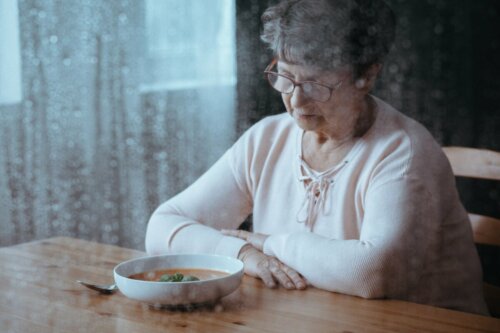Loss of Appetite: Why Does It Occur?

You’ve probably experienced a sudden (or gradual) loss of appetite before. This symptom can become normal if it happens at specific moments in your life. However, when this becomes recurrent or intense, you must go see a doctor so you don’t put your health at risk.
In this article, we’ll be talking about some of the possible causes that could explain loss of appetite. As you’ll see, there are both medical and psychological causes (in some cases, it could be a combination of the two).
Loss of appetite: why does it occur?
Before delving into the possible causes that may explain loss of appetite, we’re going to explain what it consists of. Basically, it occurs when the desire to eat decreases or disappears. In certain sources, an abnormal loss of appetite is called anorexia. Thus, it’s important that you don’t confuse it with the eating disorder, which has the same name.
Although loss of appetite can occur at different times in your life (and it doesn’t have to be something to worry about). For example, it may because you’re going through a specific time of stress. However, if this occurs repeatedly or intensely, the situation could make you sick. Thus, when this happens, the best thing to do is go see a medical professional so they can evaluate your case.
Why does loss of appetite occur? We’re going to list some of its possible causes. Nevertheless, each particular case should be evaluated.
Infectious diseases
Certain infectious diseases could explain loss of appetite, especially those that affect the digestive tract, inhibiting a person’s desire to eat.
Some of them are derived from food poisoning. On the other hand, certain food intolerances, such as lactose or gluten intolerance, could also reduce appetite.
Intense emotional stress
Going through a time of intense emotional stress can lead to severe loss of appetite. Emotional stress can arise as a consequence of multiple things. For example, moving to a different country, changing jobs, unemployment, losing a loved one, the end of a relationship, falling in love, and the birth of a child, among others. As you can see, both positive and negative situations can generate emotional stress.

Side effects of certain drugs
Loss of appetite can also occur due to the side effects of certain medications, such as weight-loss drugs or psychostimulants (to treat disorders such as ADHD). On the other hand, chemotherapy can also cause this symptom.
Other diseases
Certain diseases can also cause loss of appetite or reduce a person’s appetite. A study that Domínguez, Nold, Llorente, and Ramírez (2011) conducted at the Superior Institute of Medical Sciences of Santiago suggests that kidney or heart failure and hepatitis are some of these diseases, as well as HIV.
Another disease that may explain this symptom is cancer. Sometimes, loss of appetite occurs during the advanced stages of this illness. Other times, individuals may experience it at the beginning.
Mental disorders
Some mental disorders could also cause this symptom. The most common are depression, dysthymia, anorexia, anxiety disorders, and schizophrenia.
A person’s state of mind
According to a study by Baena, Sandoval, Urbina, Juárez, and Villaseñor (2005), a low mood could also explain a sudden loss of appetite. Perhaps you haven’t noticed, but when you’re feeling down, you tend to be less hungry. However, we must say that some people experience the opposite so they tend to eat more when they’re sad.
Old age
Old age is a stage in life where loss of appetite appears frequently (Bofill, 2005). In these cases, this symptom received the name of hyporexia (it’s also used to refer to loss of appetite in children).
Some of the causes that would explain hyporexia in older people are, on one hand, that elderly people tend to perceive smells and tastes less than younger people and, on the other, certain social and personal circumstances (loss of loved ones, feeling lonely or abandoned, and side effects of some drugs, among other reasons).

The time of year (summer)
Individuals tend to experience a loss of appetite more frequently during the summertime. This is so because, at this time, the body doesn’t need as much food to keep warm (which doesn’t happen in the winter, for example). In addition, metabolism slows down and, therefore, it’s common to lose the desire to eat.
On the contrary, what happens during the winter? You feel hungrier because your body needs more food to conserve heat and more energy to burn and maintain body temperature.
Loss of appetite: listening to your body
As you can see, the causes that’d explain why you feel a sudden or gradual, transitory, or prolonged loss of appetite are plenty; from intense or negative emotional states, to stressful situations, to medical illnesses or mental disorders.
In order to avoid putting your health at risk, you need to be attentive to your body and pay attention to your symptoms and vital situations and moods. Keeping this in mind will make it easier for you to ask for help when you need to.
You’ve probably experienced a sudden (or gradual) loss of appetite before. This symptom can become normal if it happens at specific moments in your life. However, when this becomes recurrent or intense, you must go see a doctor so you don’t put your health at risk.
In this article, we’ll be talking about some of the possible causes that could explain loss of appetite. As you’ll see, there are both medical and psychological causes (in some cases, it could be a combination of the two).
Loss of appetite: why does it occur?
Before delving into the possible causes that may explain loss of appetite, we’re going to explain what it consists of. Basically, it occurs when the desire to eat decreases or disappears. In certain sources, an abnormal loss of appetite is called anorexia. Thus, it’s important that you don’t confuse it with the eating disorder, which has the same name.
Although loss of appetite can occur at different times in your life (and it doesn’t have to be something to worry about). For example, it may because you’re going through a specific time of stress. However, if this occurs repeatedly or intensely, the situation could make you sick. Thus, when this happens, the best thing to do is go see a medical professional so they can evaluate your case.
Why does loss of appetite occur? We’re going to list some of its possible causes. Nevertheless, each particular case should be evaluated.
Infectious diseases
Certain infectious diseases could explain loss of appetite, especially those that affect the digestive tract, inhibiting a person’s desire to eat.
Some of them are derived from food poisoning. On the other hand, certain food intolerances, such as lactose or gluten intolerance, could also reduce appetite.
Intense emotional stress
Going through a time of intense emotional stress can lead to severe loss of appetite. Emotional stress can arise as a consequence of multiple things. For example, moving to a different country, changing jobs, unemployment, losing a loved one, the end of a relationship, falling in love, and the birth of a child, among others. As you can see, both positive and negative situations can generate emotional stress.

Side effects of certain drugs
Loss of appetite can also occur due to the side effects of certain medications, such as weight-loss drugs or psychostimulants (to treat disorders such as ADHD). On the other hand, chemotherapy can also cause this symptom.
Other diseases
Certain diseases can also cause loss of appetite or reduce a person’s appetite. A study that Domínguez, Nold, Llorente, and Ramírez (2011) conducted at the Superior Institute of Medical Sciences of Santiago suggests that kidney or heart failure and hepatitis are some of these diseases, as well as HIV.
Another disease that may explain this symptom is cancer. Sometimes, loss of appetite occurs during the advanced stages of this illness. Other times, individuals may experience it at the beginning.
Mental disorders
Some mental disorders could also cause this symptom. The most common are depression, dysthymia, anorexia, anxiety disorders, and schizophrenia.
A person’s state of mind
According to a study by Baena, Sandoval, Urbina, Juárez, and Villaseñor (2005), a low mood could also explain a sudden loss of appetite. Perhaps you haven’t noticed, but when you’re feeling down, you tend to be less hungry. However, we must say that some people experience the opposite so they tend to eat more when they’re sad.
Old age
Old age is a stage in life where loss of appetite appears frequently (Bofill, 2005). In these cases, this symptom received the name of hyporexia (it’s also used to refer to loss of appetite in children).
Some of the causes that would explain hyporexia in older people are, on one hand, that elderly people tend to perceive smells and tastes less than younger people and, on the other, certain social and personal circumstances (loss of loved ones, feeling lonely or abandoned, and side effects of some drugs, among other reasons).

The time of year (summer)
Individuals tend to experience a loss of appetite more frequently during the summertime. This is so because, at this time, the body doesn’t need as much food to keep warm (which doesn’t happen in the winter, for example). In addition, metabolism slows down and, therefore, it’s common to lose the desire to eat.
On the contrary, what happens during the winter? You feel hungrier because your body needs more food to conserve heat and more energy to burn and maintain body temperature.
Loss of appetite: listening to your body
As you can see, the causes that’d explain why you feel a sudden or gradual, transitory, or prolonged loss of appetite are plenty; from intense or negative emotional states, to stressful situations, to medical illnesses or mental disorders.
In order to avoid putting your health at risk, you need to be attentive to your body and pay attention to your symptoms and vital situations and moods. Keeping this in mind will make it easier for you to ask for help when you need to.
All cited sources were thoroughly reviewed by our team to ensure their quality, reliability, currency, and validity. The bibliography of this article was considered reliable and of academic or scientific accuracy.
- Austin, J., & Marks, D. (2009). Hormonal Regulators of Appetite. International Journal of Pediatric Endocrinology. https://doi.org/10.1155/2009/141753.
- Baena, A., Sandoval, M.A., Urbina, C., Juárez, N.H. y Villaseñor, S. (2005). Los trastornos del estado de ánimo. Revista Digital Universitaria, 6(11): 2-14.
- Bofill, S. (2005). Cuerpos inapetentes. La pérdida de apetito y la desgana en el proceso de envejecimiento de Cataluña. Trabajo social y salud, 51: 47-74.
- Domínguez, R., Nold, R., Llorente, Y.B. y Ramírez, M.C. (2011). Estado de los conocimientos sobre alimentación y nutrición de las personas que viven con VIH/SIDA. Influencia en la prevención del síndrome de desgaste. Rev Cubana Aliment Nutr, 21(2): 263-274.
This text is provided for informational purposes only and does not replace consultation with a professional. If in doubt, consult your specialist.







